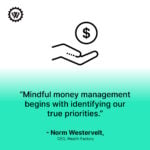Have you ever heard of mindful money management? It’s not the same as budgeting for business. Budgeting is more of a strict discipline that we force upon ourselves. Budgeting for business often involves cutting out enjoyable things from our lives and making sacrifices in the name of scrimping and saving. At Wealth Factory, we think budgeting like this sucks, and in today’s full episode, please join our Wealth Factory CEO for a brief masterclass in mindful money management. Also, be sure not to miss out on the link at the end to gain access to download our EXCLUSIVE Financial Freedom Formula Course!
What is Mindful Money Management?

Mindfulness of any kind is an awareness. As it relates to money, mindfulness means a total awareness of each dollar coming in and each dollar going out. Many clients come to Wealth Factory because they are running successful businesses but still feel ‘cash starved.’ Usually, the cause of that starvation is not keeping track of where their money is going. Tracking is different from budgeting. Many programs focus on creating a budget, but at Wealth Factory, we talk instead about tracking the Four Different Types of Expenses.
What are the Four Different Types of Expenses?
Let’s briefly touch on the Four Different Types of Expenses, but for a more detailed explanation, be sure to watch the full episode. Also, please don’t forget to download Wealth Factory’s exclusive Financial Freedom Formula Course. Read through the Four Different Types of Expenses, then click the link to learn more!
Number One: Productive Expenses
Productive expenses include investing in yourself or your business in ways that will eventually yield a return on your investment. Spending a few hundred dollars on advertising to create a couple thousand dollars in revenue is an example of Productive Expenses.
Number Two: Protective Expenses
Protective expenses include our necessities and expenses that keep us healthy and mitigate risk. Varying insurance policies and savings accounts are both examples of Protective Expenses.
Number Three: Lifestyle Expenses
Lifestyle expenses include the money you can safely spend on yourself and your loved ones for fun, leisure, and entertainment–guilt free!
Number Four: Destructive Expenses
Destructive expenses are those that incur debt for nonproductive purposes. The purpose of most destructive expenses is simply to consume. If we incur debt so we can get a vehicle to get us to work every day, that debt is still considered a Productive Expense. Some good examples of Destructive Expenses include debt incurred in the pursuit of an addiction or debt incurred from making extravagant purchases on impulse.
Mindful cash management means recognizing the expenses that we have in our life, knowing that we have the money to cover them, and learning to become a responsible spender. It isn’t about budgeting whatsoever. Watch the full masterclass, and answer some compelling questions for yourself that can help you determine where you are with Mindful Money Management, and then fast-track your progress by downloading our Financial Freedom Formula course.

